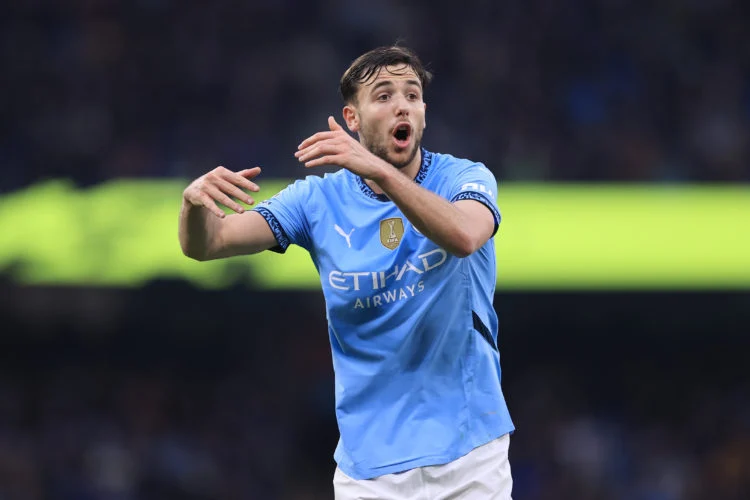Fabrizio Romano shares what disappointed Man City about Nico Gonzalez as he could be sold now

The world of football transfers is often characterized by ambitious signings, calculated risks, and occasionally, unexpected disappointments. Manchester City’s acquisition of Nico Gonzalez in January 2025 was initially hailed as a strategic move that would provide depth to their midfield and offer cover for the irreplaceable Rodri. However, just months later, the narrative has shifted dramatically, with reports suggesting that both the club and the player are prepared to part ways before the completion of his first full season at the Etihad Stadium.
This situation represents more than just a failed transfer; it highlights the complex dynamics of modern football, where even the most successful clubs can miscalculate the integration of talented players into their systems. The case of Nico Gonzalez at Manchester City serves as a fascinating study in the intersection of tactical requirements, player expectations, and the ruthless efficiency that defines elite football in the contemporary era.
The Background: A Promising La Masia Graduate
Nico Gonzalez’s journey to Manchester City began in the hallowed halls of La Masia, Barcelona’s renowned youth academy that has produced some of the greatest talents in football history. As a product of this prestigious system, Gonzalez carried with him the technical proficiency, tactical awareness, and footballing intelligence that have become synonymous with Barcelona’s playing philosophy.
The 23-year-old midfielder’s development at Barcelona was closely monitored by clubs across Europe, with his versatility being particularly attractive to potential suitors. His ability to operate as both a holding midfielder and a more advanced number eight position made him an appealing prospect for teams looking to add depth and flexibility to their midfield configurations.
Before his eventual move to Manchester City, Gonzalez had spent time at Porto, where he further honed his skills and gained valuable experience in a competitive European environment. His performances in Portugal demonstrated his ability to adapt to different tactical systems and playing styles, qualities that would later influence Manchester City’s decision to pursue his signature.
The January Transfer: High Hopes and Strategic Positioning
When Manchester City secured Nico Gonzalez’s services in January 2025, the transfer was viewed through the lens of strategic squad building. The club’s need for midfield depth, particularly in the holding midfield position, had become increasingly apparent as the season progressed. With Rodri’s importance to the team’s tactical structure well-established, the Spanish international’s injury concerns had exposed the lack of suitable cover in that crucial position.
Pep Guardiola’s initial enthusiasm for the signing was evident in his public statements following the transfer. The Manchester City manager, known for his meticulous attention to tactical detail and his ability to develop players within his system, saw in Gonzalez a player who could be molded to fit the club’s specific requirements. The prospect of working with a La Masia graduate under Guardiola’s guidance seemed like a natural fit, given the manager’s own deep connections to Barcelona’s footballing philosophy.
The financial investment made by Manchester City in securing Gonzalez’s services reflected their confidence in his potential contribution to the team. While the exact transfer fee was not disclosed, reports suggested that the club viewed the signing as a long-term investment that would provide value both in terms of immediate squad depth and future potential.
Tactical Expectations vs. Reality
The fundamental challenge that emerged following Gonzalez’s arrival at Manchester City centered on the gap between tactical expectations and on-field reality. While the club had identified him as a potential solution to their midfield depth issues, the transition from theory to practice proved more complicated than anticipated.
Manchester City’s tactical system under Pep Guardiola demands specific attributes from players in different positions. The holding midfielder role, in particular, requires not only technical proficiency but also the ability to read the game, distribute the ball effectively under pressure, and provide defensive stability. These requirements go beyond basic footballing ability and extend into the realm of tactical intelligence and positional discipline.
Gonzalez’s background as a more natural number eight, despite his versatility, may have contributed to the challenges he faced in adapting to Guardiola’s specific tactical requirements. The nuances of playing in a Guardiola system often require significant adjustment periods, even for experienced players. The demanding nature of the tactical instructions, combined with the high-pressure environment of competing for one of the world’s most successful clubs, created a challenging adaptation process.
The Impact Assessment: Fabrizio Romano’s Revelations
The recent insights shared by transfer expert Fabrizio Romano have provided a clearer picture of Manchester City’s assessment of Nico Gonzalez’s impact since his arrival. According to Romano’s reports, the club’s evaluation of the player’s contribution has been less than satisfactory, leading to questions about his long-term future at the Etihad Stadium.
Romano’s revelation that Manchester City do not consider Gonzalez a “crucial” part of their project represents a significant shift in perspective from the optimism that surrounded his initial signing. This assessment, coming just months after the transfer, suggests that the club’s expectations were not met during the player’s integration period.
The specific nature of the disappointment, as outlined by Romano, focuses on the player’s impact upon moving to the Etihad Stadium. This suggests that while Gonzalez may possess the technical abilities and tactical awareness expected of a Manchester City player, his ability to translate these qualities into meaningful contributions within the team’s system has been questioned.
The Rotation Dilemma: Squad Depth vs. Regular Playing Time
One of the key factors contributing to the current situation appears to be Gonzalez’s position within Manchester City’s rotation system. Romano’s comments about the player not being “so important in the rotations of Manchester City” highlight a fundamental challenge faced by many players joining elite clubs: the balance between providing squad depth and receiving sufficient playing time to develop and showcase their abilities.
Manchester City’s squad depth is renowned throughout world football, with the club possessing multiple high-quality options in virtually every position. This depth, while providing tactical flexibility and insurance against injuries, also creates intense competition for playing time. For a player like Gonzalez, who joined the club with expectations of making a meaningful contribution, the reality of limited opportunities may have been a significant factor in the current situation.
The rotation system employed by Guardiola, while effective in maintaining squad freshness and tactical flexibility, requires players to be ready to contribute immediately when called upon. This system favors players who can quickly adapt to different tactical requirements and make an immediate impact in limited appearances. For Gonzalez, the challenge of proving his worth within this framework may have proven more difficult than initially anticipated.
The Barcelona Connection: A Dream Deferred
The emotional and psychological aspects of Gonzalez’s situation cannot be overlooked when analyzing his current predicament at Manchester City. The player’s well-documented love for Barcelona, expressed in his 2022 statements, provides important context for understanding his mindset and motivations.
Gonzalez’s revelation that he rejected Manchester City’s pursuit when he was 16 years old demonstrates his deep connection to Barcelona and his original intention to build his career at the Catalan club. His statement that he “would stay here for my whole life” if Barcelona wanted him reflects a level of emotional investment that goes beyond professional considerations.
This background adds a layer of complexity to his current situation at Manchester City. The psychological impact of being away from his dream club, combined with the challenges of adapting to a new tactical system and culture, may have contributed to the difficulties he has experienced in making the desired impact at the Etihad Stadium.
The Market Dynamics: Summer Transfer Window Implications
The timing of these developments, coinciding with the summer transfer window, creates additional pressures and opportunities for all parties involved. Manchester City’s willingness to consider offers for Gonzalez, despite the relatively recent nature of his signing, reflects the club’s pragmatic approach to squad management and their commitment to maintaining the highest standards of performance.
The reported interest from clubs across Europe and Saudi Arabia demonstrates that Gonzalez’s market value remains intact, despite the challenges he has faced at Manchester City. This interest provides the club with options for recouping their investment while allowing the player to find a more suitable environment for his development.
The summer transfer window’s dynamics also create urgency for decision-making. With clubs across Europe looking to strengthen their squads for the upcoming season, the availability of a player with Gonzalez’s profile and potential may generate significant interest. This market activity could accelerate the resolution of his situation at Manchester City.
The Guardiola Factor: Tactical Evolution and Player Development
Pep Guardiola’s role in this situation extends beyond his initial enthusiasm for the signing. The manager’s ability to develop players and integrate them into his tactical system has been well-documented throughout his career. However, the case of Gonzalez suggests that even Guardiola’s expertise has limitations when it comes to certain player-system combinations.
The tactical evolution of Manchester City under Guardiola has been characterized by continuous refinement and adaptation. The specific requirements for each position within his system have become increasingly specialized, demanding not only technical proficiency but also the ability to execute complex tactical instructions under pressure. This evolution may have made it more challenging for new signings to quickly integrate into the team’s playing style.
Guardiola’s assessment of Gonzalez’s contribution, while not explicitly stated, can be inferred from the club’s current stance on the player’s future. The manager’s pragmatic approach to squad management, combined with his high standards for performance, likely influenced the club’s decision to consider the player’s departure.
Financial Implications: Investment vs. Return
The financial aspects of the Gonzalez situation provide insight into Manchester City’s approach to squad building and investment management. The club’s significant investment in the player during the January transfer window represents a calculated risk that has not yielded the expected returns.
The potential sale of Gonzalez during the summer window would likely result in a financial loss for Manchester City, given the short timeframe between his arrival and potential departure. However, the club’s financial resources and commitment to maintaining squad quality may make this loss acceptable if it allows for better allocation of resources to players who can make a more significant impact.
The financial implications also extend to the player’s personal situation. A move away from Manchester City could provide Gonzalez with better opportunities for regular playing time and career development, potentially offsetting any short-term financial considerations.
The Broader Context: Modern Football’s Transfer Challenges
The Nico Gonzalez situation at Manchester City reflects broader challenges facing modern football’s transfer market. The increasing specialization of tactical systems, combined with the high-pressure environment of elite clubs, has made successful player integration more challenging than ever before.
The case highlights the importance of not only identifying talented players but also ensuring that their specific attributes align with the tactical requirements of their new clubs. The gap between theoretical suitability and practical application has become increasingly significant in determining transfer success.
This situation also demonstrates the evolving nature of player expectations and career management. Modern players, particularly those with strong emotional connections to specific clubs, may find it more difficult to adapt to environments that do not align with their personal and professional aspirations.
Looking Forward: Lessons and Implications
The Nico Gonzalez situation at Manchester City provides valuable lessons for clubs, players, and the broader football community. The importance of thorough due diligence in assessing not only a player’s technical abilities but also their psychological readiness for new challenges has been highlighted.
For Manchester City, this experience may influence their approach to future signings, particularly in terms of the integration process and the timeline for assessing new players’ contributions. The club’s willingness to make difficult decisions when investments do not yield expected returns demonstrates their commitment to maintaining their competitive standards.
For Gonzalez, the experience at Manchester City, while challenging, may provide valuable insights into his own strengths and areas for development. A potential move to a club where his specific attributes are better suited to the tactical system could reignite his career trajectory and allow him to fulfill his considerable potential.
Conclusion: A Tale of Expectations and Reality
The story of Nico Gonzalez at Manchester City serves as a compelling illustration of the complex dynamics that define modern football transfers. What began as a promising signing with clear tactical logic has evolved into a situation that highlights the challenges of player integration, tactical adaptation, and the management of expectations in elite football.
The rapid timeline from optimistic signing to potential departure reflects the unforgiving nature of modern football, where players and clubs must quickly adapt to changing circumstances. The case demonstrates that even the most successful clubs and experienced managers can face challenges in integrating new players into their systems.
As the summer transfer window progresses, the resolution of Gonzalez’s situation will provide closure to this chapter while potentially opening new opportunities for both the player and Manchester City. The lessons learned from this experience will likely influence future transfer decisions and highlight the importance of comprehensive evaluation processes in modern football.
The Nico Gonzalez situation ultimately represents more than just a failed transfer; it embodies the ongoing evolution of football, where tactical sophistication, player psychology, and market dynamics converge to create increasingly complex challenges for all stakeholders involved. As the football world continues to evolve, such situations will likely become more common, requiring all parties to adapt their approaches to player recruitment, development, and integration.















